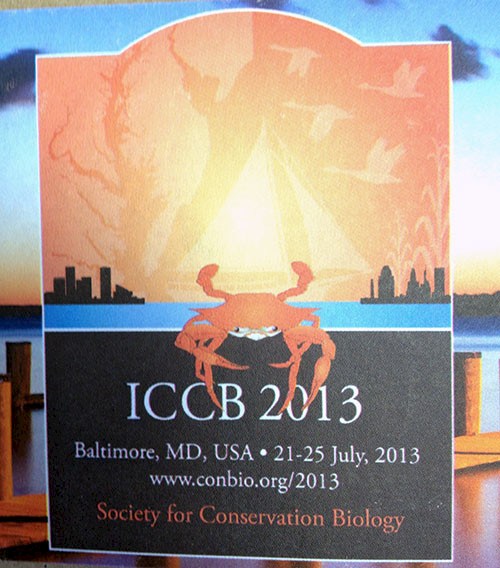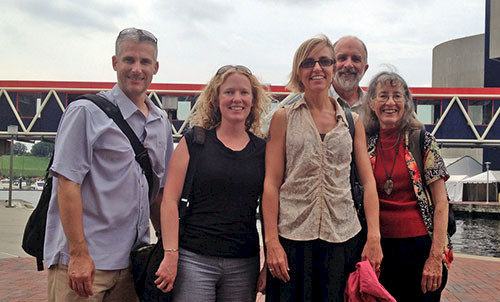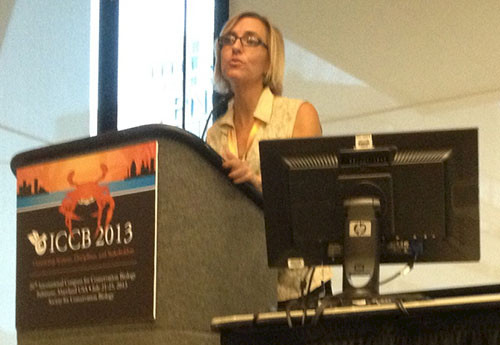Talking about report cards at the International Congress for Conservation Biology
Bill Dennison · | Environmental Report Cards |The Society for Conservation Biology sponsors a biennial conference and their 26th International Congress for Conservation Biology 2013 was held at the Baltimore Convention Center. I attended the session "Advancing Science-informed Ocean Management Decisions Through Ecosystem Health Report Cards". The session was organized by Melanie McField, Smithsonian Institution, Jason Vasques, Coral Reef Alliance and Liz Whiteman, California Ocean Science Trust.

Jason Vasques spoke about the way report cards tap into a basic element of human nature. He also spoke of the ability of report cards to distill data and help focus efforts. Liz Whiteman considered report cards as an "opportunity to get science to the table of decision making". She spoke of the way report cards focused on education and outreach and was investigating the use of report cards as a management tool, as applied to the Marine Protected Area network in the state of California. Judy Lang from the Atlantic and Gulf Rapid Reef Assessment presented the progress that she and Pat Kramer are making on developing a report card for the Bahamas. Interestingly, the Bahamas have a combined reef area similar in size to the Mesoamerican Reef, which stretches from Yucatan, Mexico, to Belize, Guatemala and Honduras. The Bahamas report card was going to focus on coral reef condition and threats, and the challenge they are facing is the stratification of different types of reefs. Melanie McField from presented the 2012 Mesoamerican Reef report card, which follows their 2008 and 2010 report cards. IAN staff worked with Melanie to develop the original 2008 report card and she has continued to develop and modify the report card. The 2012 report card used four indicators; coral cover, macroalgal cover, key herbivorous fish and key commercial fish. The Healthy Reefs for Healthy People partnership also initiated an Eco-Audit in 2011 which targets implementation of management practices. They found that the stoplight color scheme used for the reef health was too emotive for use in evaluating management practices and needed to be modified to a single neutral color (blue). Melanie spoke about how the initial report card in 2008 helped to fully protect parrotfish, a keystone species in coral reef ecosystems.

My talk was titled "Environmental Report Cards: A tool to integrate monitoring data, engage stakeholders and catalyze actions". I reviewed our five step approach for developing environmental report cards, provided an update of our Chesapeake report card, and discussed the 'stat-ing' governance model which incorporates report cards. At the end, I reflected on the 15 years that I have been involved in developing environmental report cards. I noted that the initial report card requires the most effort, particularly in allaying peoples' fears of trying out something new that is scrutinized publicly. I emphasized the advantage of creating a regular public dialog with the annual report card releases that can build community knowledge. I also spoke about the need for 'adaptive monitoring' as part of 'adaptive management' and both the monitoring program and the report cards need to evolve over time. Report card fatigue can set in, particularly if the grades are not changing over time. Reinventing the report card with new analyses, new indicators and novel ways of communicating results can allow the consistency and rigor to continue, but also provide additional ways to engage people.

Some of the discussion included the use of expert judgement, and I cited the example of our first Moreton Bay report card which was generated entirely by expert opinion. After we were able to develop an Ecosystem Health Monitoring Program and set up a quantitative report card scheme, we compared our expert opinion with the calculated report card scores. What we learned was the the best and the worst areas were indeed identical, but that the middle scores did diverge. On reflection, we allowed our own biases to affect the grading, and I think that expert opinion needs to be supported with quantitative metrics. Another discussion item was the importance of climate change and the need to account for climate in environmental reporting. The Mesoamerican reef grades for Mexico were improving since 2008, but Melanie pointed out that this was most likely tracking the recovery from Hurricane Wilma in 2005. Grading schemes were also discussed, with the observation that site selection can be used to 'game the system' by selecting only good or only bad sites. The general feeling was that academics felt that the grading schemes were too easy or lenient, while resource managers felt that the grading schemes were too hard or stringent. The need for new indicators was discussed, with the invasive lionfish cited as an example from the Caribbean.
The session was well attended and I enjoyed being in a room of international conservation biologists talking about something that I am passionate about, after sleeping in my own bed. It is great when an international meeting comes to your backyard! I had lunch with other speakers in our session and we initiated a discussion of how we can continue this conversation among practitioners of environmental report cards, develop best practices methodologies and enhance the ability of report cards to lead to good conservation outcomes.
About the author
Bill Dennison

Dr. Bill Dennison is a Professor of Marine Science and Vice President for Science Application at the University of Maryland Center for Environmental Science.